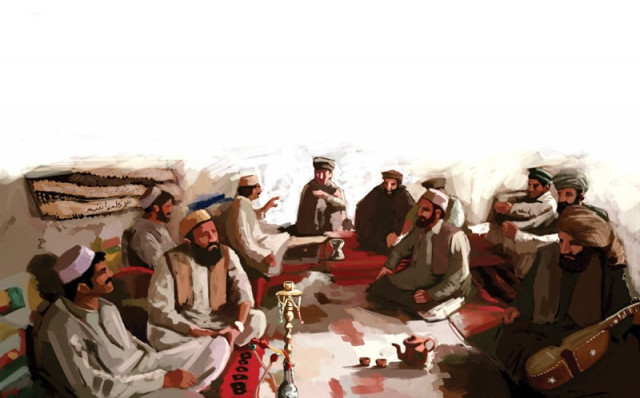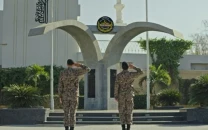Cultural revival: The resilient poets of Waziristan declare war of words
Waziristan Adabi Baheer was formed a year ago and continues to face an uphill battle for survival.

The word baheer, coming from the local Pashto dialect, means a bundle of firewood which Pukhtun women collect from far-off places and bring home on their heads. Even today, the tradition of baheer prevails among the evergreen trees of mountainous valleys near the Pak-Afghan border.

Formed almost a year ago on August 27, the society brings together dozens of local personalities, especially poets, to bring back Waziristan’s literary values from the brink of extinction. These patrons of culture have managed to publish a self-sponsored book named Sharik Burjal, which contains the poetry of over 40 local literatis in the form of poetry and ghazals.
The society regularly meets to hold mushairas in different areas of Waziristan, where interested people from both North and South Waziristan and adjacent districts of Khyber-Pakhtunkhwa participate.
“In a short time, more than 700 copies of Sharik Burjal have been sold,” said the proud president of the society, Niaz Ali, who writes under the pen name Watan Jar – meaning lover of the soil. “The tribals are taking an interest in our activities; that is why they show up in large numbers for our gatherings.”
The poets of Waziristan Adabi Baheer say their poetry reflects their feelings as a tribal society. In their expressions, one can find an adoration for their land, history, culture, and a venom for their enemies.

Wana’s Mughal Khel village is home to one such young poet and folk singer, Shaukat Aziz Shaukat, who has recently authored a book called Nan Lewani Zrha Raata Dasay O Wayal – Today my mad heart spoke to me thus. An excerpt from this narrative of despair speaks of the current ordeal that his home has been subjected to, and goes like this:
Zamong da weer na adeeray starhi di – The graveyards grow weary of our cries
Pa jaragano mo sta khulay starhi di – Our lips grow weary of weeping
Darta ba hal da kali sa o wayam? – How do I tell you the situation of my land?
La janazo na mo ugay starhi di – Our shoulders grow weary of carrying coffins
Che warta zrha wayee bas hagha kawi – They do what their hearts tell them to do
Kani zamong war poray khulay starhi di – While our mouths grow weary of preventing them
Wana’s other veteran of words is white-bearded Nisar Ahmad Nisar, locally known as Nisar Lala. Once an ardent member of Bacha Khan’s Khudai Khidmatgar movement, Nisar later turned his attention towards Pashto poetry.
“The tribes of Waziristan have long defended their culture against external threats,” says Nisar Lala. “Although there has been no literary society of note and our people remain mostly illiterate, our traditions have persevered and the tribal love for poetry and literature remains alive.”
He writes in his book Manzal O Mahzal (The Destination and the Journey):
Bya tanrai pray ka bewaara lewanai sha – Then sever your chains and be an uncontained madman
Da watan da azadi ta spelanai sha – Become a sacrifice for the freedom of your nation
“The aim of the Waziristan Adabi Baheer is to work on the preservation of our language, literature and culture,” explained Ali. “This area has its own unique dialect which needs to be protected from outside influences. Our society is also keeping a written record of quotations, proverbs and folk songs which have been passed down for generations. If we do not do this now, the heritage of our ancestors will be lost to history.”
Ali added that the members of Waziristan Adabi Baheer have to dig deep into their own pockets in order to keep breathing life into their society. At the moment, there is no governmental or non-governmental organisation that is sponsoring us, he said. “It is just our own thirst and determination that keeps us going.”
Shaukat Aziz Shaukat says the tribals of Waziristan are a culture-loving people who have strong affections for literature.
“When it comes to gharanai sandaray – songs of the mountains – every tribal man and woman becomes a singer,” he says. “The main themes of such songs are war and love. Hence, they are sung at both occasions of joy and unrest.”
Gharanai sandaray are usually sung to a slow attan dance and drumbeat. When a tribal jirga orders a lashkar to fight, such gatherings are held to praise war heroes of forgotten days. “These are the remnants of culture that we need to salvage as a people, and the Waziristan Adabi Baheer does exactly that.”
Even today, when the rubab is still played, the attan still performed and gharanai sandaray still sung, the Waziristan Adabi Baheer is an embodiment of the resilient spirits of the tribal people. Despite the overwhelming obstacles that face such evolving societies, especially the spate of militancy in the region and the military operation that followed, the determined residents of Waziristan seem to find ways to keep their ancestral culture alive.
----------------------------------------------
Zamong da weer na adeeray starhi di
Pa jaragano mo sta khulay starhi di
Darta ba hal da kali sa o wayam?
La janazo na mo ugay starhi di
Che warta zrha wayee bas hagha kawi
Kani zamong war poray khulay starhi di
----------------------------------------------
The graveyards grow weary of our cries
Our lips grow weary of weeping
How do I tell you the situation of my land?
Our shoulders grow weary of carrying coffins
They do what their hearts tell them to do
While our mouths grow weary of preventing them
Published in The Express Tribune, August 23rd, 2014.



















COMMENTS
Comments are moderated and generally will be posted if they are on-topic and not abusive.
For more information, please see our Comments FAQ